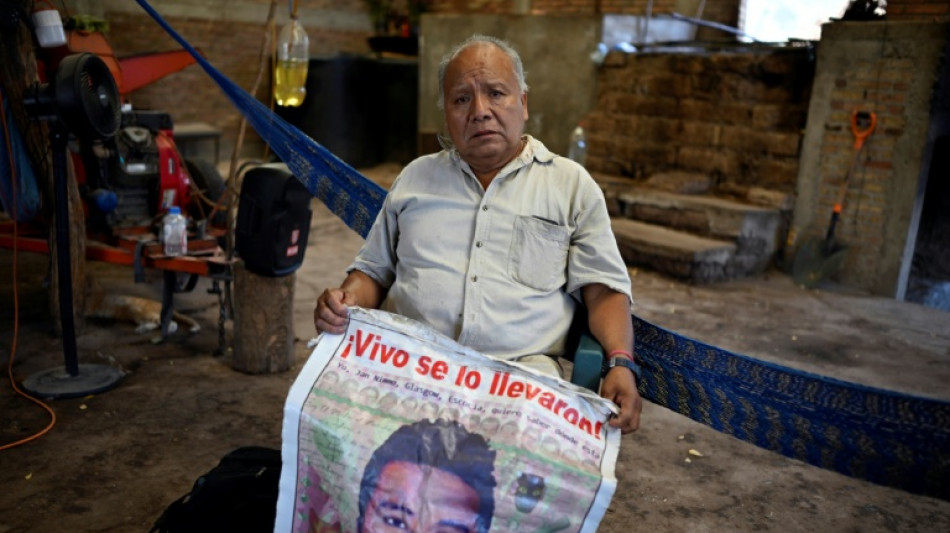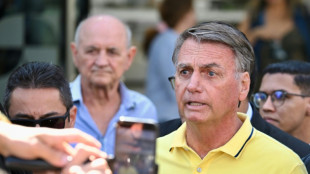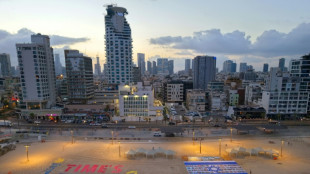
Mexicans face wall of impunity in search for justice

From parents whose children were murdered or are missing to a man imprisoned for two decades with no sentence -- many Mexicans seeking justice feel they face a wall of corruption and impunity.
The government says the justice system is rotten and that elections beginning on Sunday allowing voters to choose all judges and magistrates will help to clean it up.
Critics say the world-first vote will only politicize the judiciary.
Here are four high-profile cases illustrating the flaws of a justice system in a country where criminal groups use threats, bribes and violence to wield influence.
- 'Nothing has changed' -
"It's been 10 years and nothing has changed," said Estanislao Mendoza, whose son Miguel Angel was one of 43 students from a teacher training college who disappeared in the southern state of Guerrero in 2014.
The case, one of the country's worst human rights atrocities, has come to symbolize a missing persons crisis that has seen more than 120,000 people vanish.
Investigators believe the students were abducted by a criminal group with the help of corrupt police, possibly because a bus they commandeered to travel to a demonstration had drugs hidden inside.
This month, a former senior judge was arrested and accused of helping to conceal videos that allegedly showed the tragedy unfolding.
But despite dozens of arrests, there have been no convictions and the remains of only three victims have been identified.
"For us there is still no justice, because of the corruption of the judges," Mendoza, a 65-year-old farmer, told AFP.
- Justice 'not being served' -
The disappearance of five young Mexicans in Lagos de Moreno in the western state of Jalisco in August 2023, allegedly at the hands of drug traffickers, also shook a country that has become inured to kidnapping and killing.
The case was particularly shocking because the criminals filmed the young men being tortured and forced to attack each other.
Five suspects are being prosecuted but relatives are still waiting for the young men -- or their remains -- to be found and identified.
Armando Olmeda, whose 22-year-old son Roberto Carlos is one of the victims, feels that justice "is not being served" for the people who need it.
"We have trusted the authorities," but so far they have "not done their job properly," the 55-year-old told AFP.
- 'Worst enemy' -
The judicial system seems designed "to protect everyone except the citizen thirsty for justice," said Mario Escobar, whose 18-year-old daughter Debanhi disappeared in April 2022 in the northern state of Nuevo Leon.
Her body was found in a motel water tank, triggering a public outcry over the nation's femicide crisis.
A photo taken on the night Debanhi disappeared, showing her standing in the dark by the roadside after an altercation with a taxi driver, made her a symbol for women's rights in a country where about 10 women or girls are murdered every day.
Hypotheses suggested by investigators ranged from an accidental blow to the head to suffocation.
Time is the "worst enemy," Escobar said.
"It passes very quickly without any justice for us."
- 'Justice was denied' -
Israel Vallarta, accused of belonging to a kidnapping gang, has been in preventive detention awaiting trial since 2005 in a case that sparked a diplomatic rift between Mexico and France.
His ex-partner, Frenchwoman Florence Cassez, was freed in 2013 after the Supreme Court ruled that police violated her rights by staging her arrest on national television.
"In the case of my family, access to justice was denied," said Vallarta's sister Guadalupe.
Five of Vallarta's relatives were also accused of belonging to the same gang.
"I spent six years and nine months in prison because of my last name," said his nephew Alejandro Cortez Vallarta, who alleged authorities took him to a "torture chamber" to force a confession.
"There was a lot of corruption," he said. "I experienced it firsthand."
B.Bernard--PS

 London
London

 Manchester
Manchester
 Glasgow
Glasgow
 Dublin
Dublin
 Belfast
Belfast
 Washington
Washington
 Denver
Denver
 Atlanta
Atlanta
 Dallas
Dallas
 Houston Texas
Houston Texas
 New Orleans
New Orleans
 El Paso
El Paso
 Phoenix
Phoenix
 Los Angeles
Los Angeles



